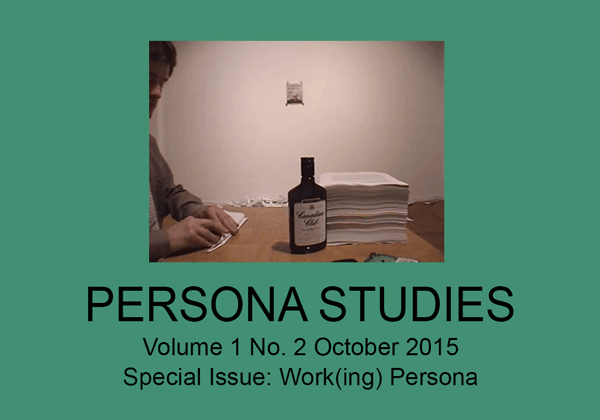Working Through Hunter S. Thompson's Strange and Terrible Saga
DOI:
https://doi.org/10.21153/ps2015vol1no2art470Keywords:
Hunter S. Thompson, cultural omnivore, celebrity, working-class identity, representationAbstract
The subjective and participatory method of New Journalism provides practitioner Hunter S. Thompson access to the kinds of creative, cultural entrepreneurship seen in postwar American narratives. In his reported and written “work,” Thompson not only self-consciously performs class personas, but markets those identities as a model of enterprise through creative economy. Thompson’s critical perspective and status position approximates what sociologists call a “cultural omnivore,” someone who consumes all forms of culture, but who reproduces a position of privilege in doing so. In Hell’s Angels (1966), Thompson uses the privilege granted by omnivoracity to transform the limitations of the worker-writer into a commodifiable and safe identity that can access and reign over other social groups. By prioritizing his status as “pro,” Thompson manipulates the symbolic and cultural capital of class identity, providing himself an opportunity to feature individual over collective politics. Yet to accomplish this, Thompson relies on representing—and exploiting—the working class. Thompson exemplifies the class performative aspect of a working persona that is able to attain cultural domination through the manipulation of working-class identities in literary markets.Downloads
References
Bourdieu, Pierre. Distinction: A Social Critique on the Judgment of Taste (1984). Trans. Richard Nice. Cambridge, MA: Harvard UP, 1996. Print.
CBC Archives. “Hunter S. Thompson Meets A Hell's Angel, 1967.” YouTube. 7 July 2010. Web. 9 July 2015.
Easy Rider. 1969. Dir. Dennis Hopper. Perf. Dennis Hopper, Peter Fonda, Jack Nicholson. Columbia Pictures, 1999, DVD.
Franklin, Benjamin. The Autobiography of Benjamin Franklin. 1889. Classic American Autobiographies, ed. William Andrews. New York: Signet Classics, 2003. 70-228. Print.
Joans, Barbara. "GLIB WITH GUTS AND GORE: I Come to Bury HT, Not to Praise Him: The Legend of Hunter Thompson" International Journal of Motorcycle Studies 1:2 (July 2005). Web. 31 August 2015.
Kieffner, Gary L. “Myth, Reality, and Revenge in Hunter S. Thompson’s Hell’s Angels.” International Journal of Motorcycle Studies 1:2 (July 2005). Web. 31 August 2015.
Newhouse, Thomas. The Beat Generation and the Popular Novel in the United States 1945-1970. Jefferson, NC: McFarland & Company, 2000. Print
McKeen, William. Outlaw Journalist: The Life and Times of Hunter S. Thompson. New York: W.W. Norton & Company, 2008. Print.
Peterson, Richard A. and Roger M. Kern. “Changing Highbrow Taste: From Snob to Omnivore.” American Sociological Review 61.5 (Oct. 1996): 900-7. Web. 9 July 2014.
Robinson, Sally. Marked Men: White Masculinity in Crisis. New York: Columbia UP, 2000. Print.
Skeggs, Beverly. Class, Self, Culture. New York: Routledge, 2004. Print.
---. Formations of Class & Gender: Becoming Respectable. London: Sage, 1997. Print.
Slotkin, Richard. Gunfighter Nation: The Myth of the Frontier in Twentieth-Century America. Norman, OK: U of Oklahoma P, 1998. Print.
Thompson, Hunter S. as Raoul Duke. “Fear and Loathing In Las Vegas: A Savage Journey Into the Heart of the American Dream.” Rolling Stone 95 (November 11, 1971): 36-48. Print.
---. “Conclusion: Fear and Loathing In Las Vegas: A Savage Journey Into the Heart of the American Dream.” Rolling Stone 96 (November 25, 1971): 38-50. Print.
Thompson, Hunter S. Fear and Loathing in Las Vegas (1971). New York: Vintage, 1998. Print.
---.“Fear and Loathing at the Super Bowl” (1974). The Great Shark Hunt: Strange Tales from a Strange Time. New York: Summit Books, 1979. 46-96. Print.
---. Hell’s Angels. 1966. New York: Ballantine, 1994. Print.
---. “The Motorcycle Gangs: Losers And Outsiders.” The Nation 200.20 (1965): 522-26. The Nation Archive. Web. 11 June 2015.
The Wild One. 1953. Dir. László Benedek. Perf. Marlon Brando, Mary Murphy. Mill Creek Entertainment, 2015, DVD.
Wolfe, Tom. “The Birth of ‘the New Journalism’; Eyewitness report by Tom Wolfe.” New York Magazine. 14 February 1972. Web. 14 July 2014.
---. “Why They Aren’t Writing the Great American Novel Anymore.” Esquire (December 1972): 152-272. Print.
Downloads
Published
Issue
Section
License
Copyright (c) 2015 Jennifer Hagen Forsberg

This work is licensed under a Creative Commons Attribution-NonCommercial 4.0 International License.







